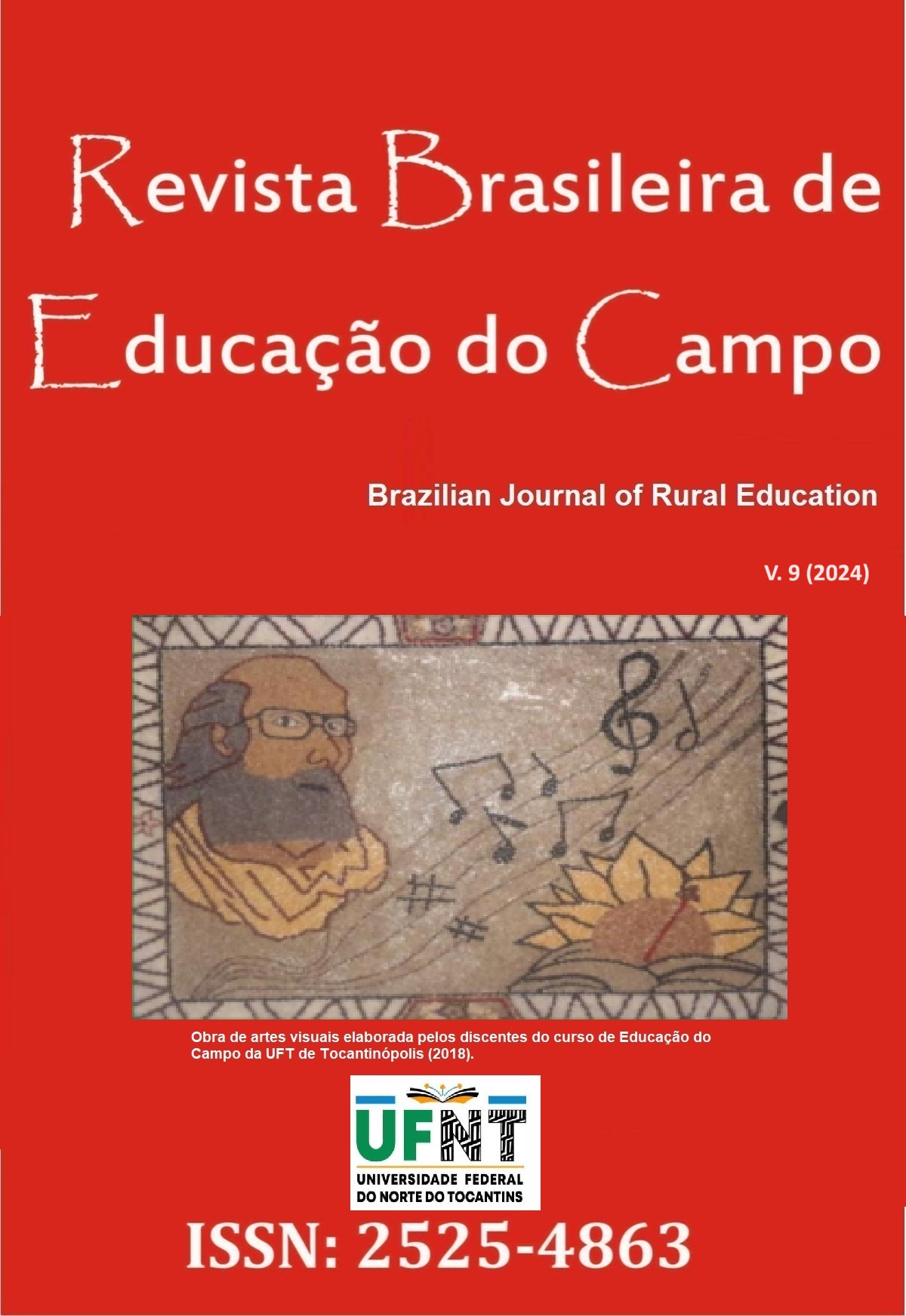Discursive genres in the literacy of children in multigroup classes in rural schools
DOI :
https://doi.org/10.70860/ufnt.rbec.e19494Mots-clés :
alfabetização, classes multisseriadas, gêneros discursivos.Résumé
This article has the following object of study: Discursive genres in the literacy of children in multigrade classes in rural schools. It needs to answer the following problem question: How can we enable the literacy of children in multi-grade classes to privilege the use of discursive genres? Considering the proposed question, we set ourselves the following objective: to understand the work with discursive genres in the literacy process of children in multigrade classes in rural schools. The concept of literacy that underpins the research is based on cultural-historical theory, which links literacy and literacy. It is a study guided by the principles of the autobiographical method, consolidated through narrative research, according to Dominicé's (1988) propositions. The narratives were produced through biographical memorials. Based on the collaborators' narratives, the study found that literacy requires the organization of time, space and the availability of reading and writing materials.
Téléchargements
Références
Arroyo, M. G. (2004). A Educação Básica e o movimento social do campo. In Arroyo, M. G., Caldart, R. S., & Molina, M. C. (Org.). Por uma educação do campo (pp. 65-86). Petrópolis: Vozes.
Bajard, É. (2012). A Descoberta da língua escrita. São Paulo, Cortez.
Bakhtin, M. (1997). Os gêneros do discurso. In Bezerra, P. (Org.). Notas da edição russa: Seguei Botcharov (pp. 164). São Paulo: Editora 34.
Brito, A. E. (2010). Narrativa escrita na interface com a pesquisa e a formação de professores. In Moraes, Z. D., & Lugli, R. S. G. (Orgs.). Docência, pesquisa e aprendizagem: (auto) biografias como espaços de formação/investigação. São Paulo: Cultura Acadêmica.
Cafiero, D. (2005). Leitura como processo: caderno do professor. Belo Horizonte: Ceale/FaE/UFMG.
Caldart, R. S. (2011). Movimento Sem Terra: Lições de Pedagogia. Rev. Currículo. sem Fronteiras, 3(1), 50-59, Recuperado de: www.curriculosemfronteiras.org. Acesso em: 17 de Julho de 2020.
Dominicé, P. (1988). O processo de formação e alguns dos seus componentes relacionais. In Nóvoa, A., & Fínger, M. (Orgs.). O método (auto)biográfico e a formação (pp. 51-61). Lisboa: Ministério da Saúde. Depart. de Recursos Humanos da Saúde/Centro de Formação e Aperfeiçoamento Profissional.
Ferreira, E.M. B., & Correia, J. R. (2020). A formação da criança leitora por meio dos gêneros do discurso: questões metodológicas. In Rev. Leitura: Teoria & Prática, 38(78), 79-95. https://doi.org/10.34112/2317-097222020v38n78p79-95. DOI: https://doi.org/10.34112/2317-0972a2020v38n78p79-95
Foucambert, J. (1994). A leitura em questão. Porto Alegre: Artes Médicas.
Freire, P. (1979). Conscientização: teoria e prática da libertação: uma introdução ao pensamento de Paulo Freire. Trad. de Kátia de Mello e Silva. São Paulo: Cortez & Moraes.
Goulart, C. (2006). Letramento e modos de ser letrado: discutindo a base teórico-metodológica de um estudo. Rev. Bras. de Educ., 11(33). https://doi.org/10.1590/S1413-24782006000300006 Acesso em: 10.out. 2021. DOI: https://doi.org/10.1590/S1413-24782006000300006
Goulart, C. (2007). A organização do trabalho pedagógico: Alfabetização e Letramento como eixos norteadores. In Brasil. Ministério da Educação. Secretaria de Educação Básica. Ensino Fundamental de nove anos: Orientações para a Inclusão da criança de seis anos de idade. 2. ed. Brasília, Ministério da Educação.
Hage, S.M. (2014). Escola de direito: reinventando a escola multisseriada. Coleção Caminhos da Educação do campo. Belo Horizonte: Autêntica.
Jolibert, J. (1994). Formando crianças leitoras. Trad. Bruno Charles Magne. Porto Alegre: Artmed.
Jolibert, J. et al. (2006). Além dos Muros da Escola: a escrita como ponte entre alunos e comunidade. Porto Alegre: Artmed. Tradução: Ana Maria Neto Machado.
Kleiman, A. B. (Org.) (1999). Os significados do letramento: uma nova perspectiva sobre a prática social da escrita. Campinas, SP: Mercado de Letras.
Marcuschi, L. A. (2002). Gêneros textuais: definição e funcionalidade. In: Dionísio, A.P; Machado, A. R., & Bezerra, M. A. (Orgs.). Gêneros Textuais e Ensino. Rio de Janeiro: Editora Lucerna.
Marcuschi, L. (2007). Produção textual, análise de gêneros e compreensão. São Paulo: Parábola Editorial.
Morais, A.G. (2012). Sistema de Escrita Alfabética. São Paulo: Melhoramentos.
Santos. E. da. C. (2014). As classes multisseriadas no contexto da educação do campo. (Monografia de Graduação). Universidade Federal do Pará, Belém.
Soares, M. (1999). Letramento: um tema em três gêneros. Belo Horizonte: Autêntica.
Téléchargements
Publié-e
Comment citer
Numéro
Rubrique
Licence
© Dilmar Rodrigues da Silva Junior 2025

Cette œuvre est sous licence Creative Commons Attribution 4.0 International.
Proposal for Copyright Notice Creative Commons
1. Policy Proposal to Open Access Journals
Authors who publish with this journal agree to the following terms:
A. Authors retain copyright and grant the journal right of first publication with the work simultaneously licensed under the Creative Commons Attribution License that allows sharing the work with recognition of its initial publication in this journal.
B. Authors are able to take on additional contracts separately, non-exclusive distribution of the version of the paper published in this journal (ex .: publish in institutional repository or as a book), with an acknowledgment of its initial publication in this journal.
C. Authors are permitted and encouraged to post their work online (eg .: in institutional repositories or on their website) at any point before or during the editorial process, as it can lead to productive exchanges, as well as increase the impact and the citation of published work (See the Effect of Open Access).














